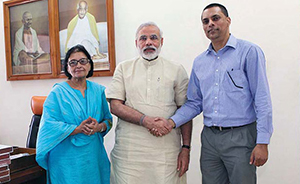An Agenda For Change
Indian culture continues to flourish and the foundations for national reconstruction and inspiration for national regeneration. The claim that cultural relations have a crucial note to play in the unfolding order is not limited to individuals or nations.
Indeed, it is being advocated by prominent people the world over—politicians, statesmen, corporate executives, scientists, scholars, artistes, humanists and philosophers. The Republic of Trinidad and Tobago has been at the crossroads in this respect. It has promoted the concept of multiculturalism and multi-religions.
|
STRATEGY FOR ENHANCED CO-OPERATION: TRINIDAD AND TOBAGO AND INDIA • Bilateral air communications between Caribbean Airlines and Air India. • Immediate construction of the Mahatma Gandhi Cultural Centre. This Centre was the focal point of discussions between the late Prime Ministers Indira Gandhi and Dr Eric Williams. • Increase scholarships in such areas as Information Technology, Culture, Arts, Hindi and Sanskrit. • Government of India should embark on a deliberate programme to assist in clay, batik, bamboo and craft products through small business. • Closer co-operation on the environment, space technology. • Aquaculture farming is another avenue for economic co-operation. • The Indian Council for Cultural Co-operation(ICCR) must play a dynamic role in cultural projects. Its role must not be restricted to specific Indian celebrations. High-profiled persons should be accorded ICCR Fellowships to visit the Indian heritage and civilizational projects • The works of India’s greats—Gandhi, Tagore, ehru and Vivekananda among others must become more accessible and scholarship and awards should be made in their names to our national citizenry. • There must be a Permanent Commission to oversee Trinidad and Tobago/India relations. • The awarding of the PBD Awards must continue unabated, and must be restricted to high profiled persons in the Indian diaspora…after all India is still in all of us. • India can assist in the development of the movie/film industry. • There is an urgent need to establish a Diaspora Secretariat within the Ministry to oversee the workings, issues, challenges of the Indian Diaspora Globally. It must comprise of a selected few of persons of repute(journalists, cultural activists, religious think-tank) who would be able to visit Diaspora Countries at regular intervals and meet with leaders in the Ministry of Overseas Indian Affairs to discuss strategies and forward-thinking proposals to further enhance the Diaspora in collaboration with the Government of India. This Secretariat will attempt to diffuse India’s first Prime Minister Pandit Jawaharlal Nehru statement he made to all overseas Indians that, “India will not stand by them where their interest will clash with local interest”. This ultimatum remains a standard one even up today, as no successive Prime Ministers or Governments ever attempted to reverse that statement. • The Government of India should, with all urgency at its command, embark on an academic study within its educational system to include a course in Diasporic Studies so that the home-based Indian people would become more aware of the beginning and growth of Indians abroad. • What about a visit by a Parliamentary Committee to the many Diasporic Countries to assemble the thoughts, feelings, aspirations and also to engender a paradigm on the Global Indian Diaspora. • The Government of India should conduct promotional advertising campaigns worldwide in some of the major media to alert the respective countries about India’s new role as a leading member of the BRICS countries, telling the world that India has come of age and investors, entrepreneurs, corporate entities and service organizations could set up shop there.
|











Comments.